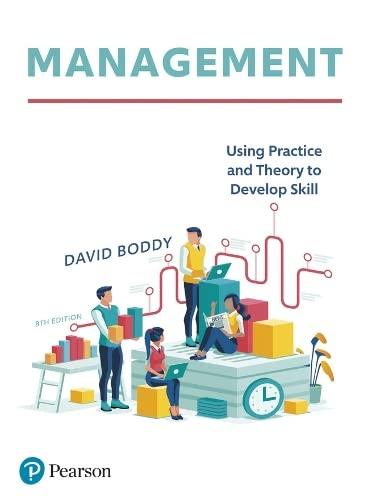Question
1.Simply announcing a new vision does not mean there will be significant change in the organization ? True or false 2.A radical change in organizations
1.Simply announcing a new vision does not mean there will be significant change in the organization ?
True or false
2.A radical change in organizations involves lots of small changes as the business operates and develops. It is often quite hard to spot but you noticed it after a long period of time
True false ?
3.Middle managers and employees at all levels should work to change organizational goals and objectives rather than relying on senior leadership. ?
4.Evolving change in organizations are changes that are unplanned and gradual.
True or false ?
5.There are several frameworks on how to implement organizational change. The following are some stage/ step frameworks EXCEPT:
A.Kurt Lewin's theory B. John Kotter's theory C. Jeanie Daniel Duck's Theory D. Patrick Dawson's theory
6.the best way to foster strong organization change and commitment includes all of the following EXCEPT:
A. Instil a broader perspective in employees' connection to their work
B. Focus on a holistic perspective on change
C. Communicate and elicit ideas from employees about the change
D. Offer high financial incentives to some employees for compliance
7. _____ is a leadership style of change where senior change managers impose change on everyone in the organization.
A.Collaborative style B.Coercive style C. Consultative style D.Directive style
8. There is no significant difference between organizational development and change management.
True False ?
9. Change ___ are people affected by the change, who have little input to the process or content of the organizational change.
A. implementers B. initiators C.facilitators D.recipients
10. Which of the following are the four change roles of change agents?
A.Implementers, initiators, recipients, and facilitators
B.Leaders, followers, resisters, and receivers
C.Initiators, champions, recipients, and facilitators
D.Agents, leaders, facilitators, and planners
11. According to Stace-Dunphy's contingency matrix, a ___ leadership style of change is suitable when the organization needs major adjustments to meet environmental conditions, where there is enough time for organizational members to participate and when there is support for a radical change.
A.directive
B.coercive
C.collaborative
D.laissez-faire
12. Which of the following happens in an organization where the organizational decline is perceived to be beyond management control?
A.Attempts to innovate are unlikely
B.The necessity for and incentive to innovate become unclear
C.Power becomes concentrated
D. Stakeholder expectations are relaxed or ill-defined.
13. Change ___ are people in organizations that chart the detailed path for change forward and make it happen in organizations. They also nurture support and alleviate resistance.
A.implementers
B.initiators
C.facilitators
D.recipients
14. Knowing the theories of organizational change are enough for change agents to implement change in organizations.
True False ?
15. Identify the potential change driver from within an organization.
A.Cognitive construction
B.National legislation
C.Economic and trading conditions
D.Power and politics
16. ___ organizational theory argue that the best way to manage change depends on the contextual and other factors such as the leadership style of the leader, the scale of the change and the capacity of the organization.
A.Contingency
B.Life cycle
c.Planned
D.Teleological
17. What is Beckhard and Harris's gap analysis?
A.The disconnect between the change plan and what is actually implemented
B.The amount of resistance from the employees about the change
C.The gap in understanding about the change situation and its stakeholders
D.The contrast between the organization's current reality and the desired future state
18. Kotter's model of change asserts that every change is different and that change can be implemented through a variety of different paths or steps in varying order.
True False ?
Step by Step Solution
There are 3 Steps involved in it
Step: 1

Get Instant Access to Expert-Tailored Solutions
See step-by-step solutions with expert insights and AI powered tools for academic success
Step: 2

Step: 3

Ace Your Homework with AI
Get the answers you need in no time with our AI-driven, step-by-step assistance
Get Started


